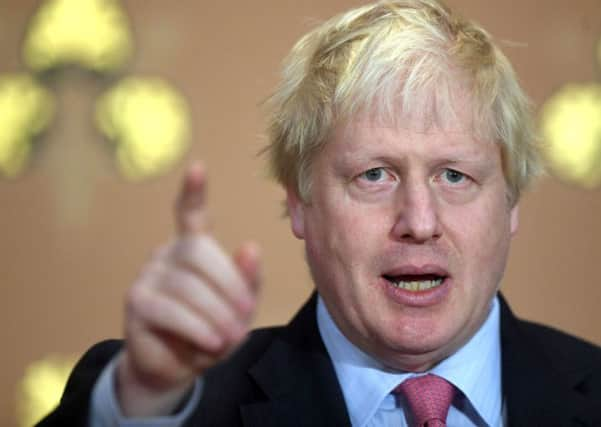Tom Tugendhat: Give Boris more power to make Britain greater


To give it strategic oversight of a budget of up to five per cent of GDP to cover the needs of all the related departments.
And let elected ministers make judgements on how to balance our strategic priorities.
Advertisement
Hide AdAdvertisement
Hide AdWe need to do something you might not expect me to say. We need to give Boris Johnson more power. And we need a reordering of priorities: diplomacy, defence, trade and aid. We need to co-ordinate our strengths.
There’s a lot I could say about other aspects of our foreign policy but I want to emphasise one important theme – the rule of law. This goes right to the heart of who we are. Because these islands, by accidents of geography, history and war have a long, unbroken tradition of justice.
Through that, we have played our part in keeping the flame of liberty alive elsewhere. That is something we can be deeply proud of.
Together with a hard-won reputation in commerce, I think this helps explain why English law and British justice are prized as the gold standard around the world.
Advertisement
Hide AdAdvertisement
Hide AdIf you don’t believe me look at China, where the Common Law is still used in Hong Kong.
And if you think that is just some vestige of empire, look at Dubai, which has opened Common Law courts to any business that wants them.
You want more?
Look at Astana, where the Kazakh president promised two years ago that its new financial centre would also be governed by English law.
And if none of these examples convinces you, then look at Russia. Vladimir Putin, the man who is doing his utmost to break the international order, is using UK jurisdictions to protect his assets.
Advertisement
Hide AdAdvertisement
Hide AdAnd then tell me that British laws are not something people value. This is where a co-ordinated approach, under an empowered Foreign Office, could make a huge difference.
Imagine if we turned this gift to our advantage.
Consider how we might use our legal tradition to help other countries that already have strong legal connections to our own?
By lending them judges, foreign investors could be reassured, and our own companies could receive a powerful, competitive advantage.
Could we combine this with another strength – higher education? Offering scholarships to talented foreign students, to study English law here in Britain?
Advertisement
Hide AdAdvertisement
Hide AdCould we devise a joined-up strategy that links justice to diplomacy, defence, trade and aid?
Could we use it to encourage anti-corruption efforts?
To make trade deals a model of transparency?
To link aid, security and infrastructure projects to a long-term mission to promote the rule of law?
Could we be more ambitious still? Could we do more to unite financial markets around the world that already rely on English law, and create a true Commonwealth of Common Law?
Countries which are at once sovereign but enjoy growing business and investment opportunities by building on shared legal understandings?
As I draw to a close, I will just emphasise a few points.
Advertisement
Hide AdAdvertisement
Hide AdI have spoken of the nation state. I have also spoken of that very traditional British strength – the rule of law.
I have spoken of the place of our lawyers, and diplomats in crafting the international rule of law. It is a unique offering to the world. But please don’t infer that I mean we should act alone.
We should not. I think we should act together, but more imaginatively and creatively than we have in recent years.
The British national interest is asserted, strengthened, amplified by alliances and multilateral institutions and reviving them is essential to our world.
We have a crucial, even essential, role to play to do that.
Advertisement
Hide AdAdvertisement
Hide AdBut multilateralism should never be seen as an end in itself – or a comforting return to a reassuring status quo.
For too long we have used the structures built by our ancestors as shields.
The institutions they built weren’t defensive ramparts, but forward operating bases.
Not places to hide, but from which to project ideals, to fight for our values, and to ensure our national interest in security and the rule of law was upheld around the world.
Advertisement
Hide AdAdvertisement
Hide AdBy empowering the Foreign and Commonwealth Office, and co-ordinating across government, we can rediscover our unique role in the world and help write the rules again.
Tom Tugendhat is a Tory MP and chairman of the Foreign Affairs Select Committee. This is an edited version of a keynote speech delivered this week by the former Army officer to the Royal United Services Institute.